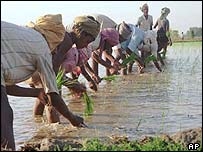PREAMBLE: World hunger spiked sharply in 2009, significantly worsening an already disappointing trend in global food security since 1996. The combination of food and economic crises has pushed the number of hungry people worldwide to historic levels.
This issue gives space to the text of a report published in the International Monetary Fund on-line bulletin: Finance & Development, March 2010, Vol 47, No 1.. The report, entitled “Hunger on the Rise” was developed by David Dawe and Denis Drechsler, based on The State of Food Insecurity in the World, published by the Food and Agriculture Organization of the United Nations (FAO) in 2009 (see below for full citations).
OVER A BILLION HUNGRY PEOPLE
The Food and Agriculture Organization of the United Nations (FAO) estimates that 1.02 billion people were undernourished in 2009—about 100 million more than in 2008. As a result, reaching the World Food Summit target and the Millennium Development Goal for hunger reduction looks increasingly out of reach.
Poor harvests are not to blame. The FAO estimates that total cereal production in 2009 was only slightly below the record high set in 2008. Instead, the increase in hunger is mainly a result of poor people’s inability to afford the food that is produced. Many drew down savings during the food price crisis and have now lost jobs as a result of the global economic crisis.
Food prices increased considerably in developing countries during the 2006–08 world food crisis and were still high when the economic crisis started. Domestic prices of staple foods were typically 17% higher at the end of 2008 than two years earlier, after adjusting for inflation. This seriously hurt the purchasing power of poor consumers, who often spend 40% of their income on staple foods.
Thus, the global economic crisis hit developing countries at a very bad time. It further reduced access to food by lowering employment opportunities, remittances from abroad, development aid, foreign direct investment, and export opportunities.
How can hunger be eliminated? Improving world food security calls for both measures for immediate relief and more fundamental structural changes. In the short term, safety nets and social protection programs must be improved to reach those most in need.
In the medium and long term, the structural solution to hunger lies in increasing agricultural productivity to increase incomes and produce food at lower cost, especially in poor countries. The importance of longer-term measures is evidenced by the unacceptably high number of people who did not get enough to eat before the crises and are likely to remain hungry even after the food and economic crises have passed. In addition, these measures must be coupled with better governance and institutions at all levels.
Source: Dawe D, Drechsler D. Hunger on the Rise, available online at: http://www.imf.org/external/pubs/ft/fandd/2010/03/picture.htm
Text material attributed to the following source: The State of Food Insecurity in the World Economic crises – impacts and lessons learned, FAO Food and Agriculture Organization of the United Nations, Rome, 2009 is available from PDF [61p.] at: ftp://ftp.fao.org/docrep/fao/012/i0876e/i0876e.pdf
FROM a Great Canadian and World Statesman
"A great gulf... has... opened between man's material advance and his social and moral progress, a gulf in which he may one day be lost if it is not closed or narrowed..."
Lester B Pearson
http://nobelprize.org/nobel_prizes/peace/laureates/1957/pearson-lecture.html
Sunday 14 March 2010
Subscribe to:
Posts (Atom)
INSPIRATIONAL WELCOME ............................... from T.S.Eliot's "Little Gidding"
If you came this way From the place you would come from... It would be the same at the end of the journey...
If you came, not knowing what you came for, It would be the same... And what you thought you came for Is only a shell, a husk of meaning... From which the purpose breaks only when it is fulfilled If at all.




















